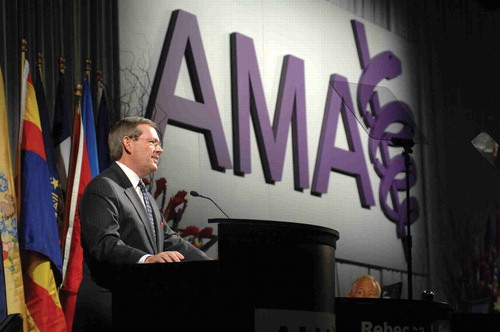Government's Commitment to P4P Creates Anxiety Among AMA Delegates
“I don't believe now, or in the future, that physicians will trust a quality-measurement system that happens in Washington,” said Health and Human Services Secretary Mike Leavitt in an address to the AMA House of Delegates during the AMA's interim meeting in Las Vegas (see article above).
Judging from discussions at the House of Delegates in the days following Leavitt's address, the secretary was on to something.
Two resolutions that would have put the house on record in opposition to the government's pay-for-performance (P4P) program were brought to reference committee hearings for debate. (One was titled “Rejection of Pay for Performance as Economic Credentialing That Will Decrease Patient Access to Health Care.”)
“P4P is not about rewarding physicians for performance; it is about allocating already existing insufficient funds in a punitive manner,” said Peter Levine, M.D., of Del Mar, Calif., expressing a common sentiment.
But P4P presents the AMA with a familiar dilemma: since value-based purchasing appears to be inevitable, with private payers and the government determined to pursue it in some fashion, an expression of blanket opposition by the organization could be to disqualify itself from future negotiations over the shape and scope of P4P.
Though the two resolutions were not approved, the house requested that the AMA board report back on the items when delegates meet again for the AMA's annual meeting next June.
At press time, John McIntyre, M.D., chair of the AMA Section Council on Psychiatry, told Psychiatric News that on behalf of the section council he would be asking the APA Board of Trustees at its meeting in Arlington, Va., this month to convene a task force to develop a position on P4P.
He also noted that AMA delegates, with input from the psychiatry delegation, approved “Pay-for-Performance Principles and Guidelines” for the development of P4P programs during the House of Delegates' 2005 annual meeting (Psychiatric News, July 15, 2005).
“This is clearly becoming a major issue for all of medicine, including psychiatry,” McIntyre said. “The challenge now is to move from those principles to influencing the P4P projects that appear in the form of pilot programs [by the government and private payers]. What we would like to see is an attempt to assess these pilot programs in an evidence-based manner to see if they are successful in improving the quality of care delivered.
“What delegates are concerned about is that the real focus isn't quality at all but cost containment. As Secretary Leavitt said in his address to the house, we aren't very good at measuring quality.”

Mike Leavitt, secretary of Health and Human Services, tells the AMA's House of Delegates that fixing America's health care system requires value-based purchasing of medical services, use of electronic health records, and a reorientation of physicians, payers, and patients to prevention and wellness rather than illness. Ted Grudzinski, AMA



